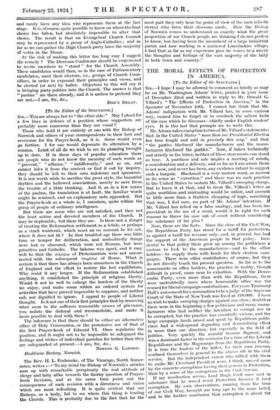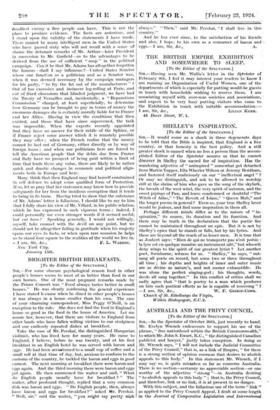THE MORAL EFFECTS OF PROTECTION IN AMERICA.
[To the Editor of the SPECTATOR.] SIR,—I hope I may be allowed to comment as briefly as may be on Mr. Washington Adams' letter, printed in your issue of December 22nd and written in reply to Mr. Oswald G. Villard's " The Effects of Protection in America," in the Spectator of November 24th. I cannot but think that Mr. Adams' indignation with Mr. Villard has, in some curious way, caused him to forget or to overlook the salient facts of the case which he discusses—chiefly under English readers' eyes. It is this last that prompts me to write this.
Mr. Adams takes exception to two of Mr. Villard's statements : that in the United States " more than one Presidential Election has been bought and sold in precisely this way," and that " the parties blackmail the manufacturers and the manu- facturers blackmail the parties." Now, if taken technically and strictly in the letter, neither of these statements can stand as true. A purchase and sale implies a meeting of minds, a consideration and a delivery, and so far as I am aware there is not now, and never has been, any evidence extant to suggest such a bargain. Blackmail is a very narrow word, as narrow in its sense as " extortion," and there was no such practice in the United States to sustain Mr. Villard's sweeping charge. But to leave it at that, and to treat Mr. Villard's letter as quite worthless and misleading would be unfair, and amount to little more than a fruitless chopping of logic, something that was, I feel sure, no part of Mr. Adams' intention. If Mr. Villard has relied on a false analogy, and has been im- provident in the use of a word, would it be right for such reasons to throw his case out of court without considering the substance of his plea ?
Now, these are the facts. Since the close of the Civil War, the Republican Party has stood for a tariff for protection, as against a tariff for revenue only, and, in general, has had the support of the American people in that policy. Inci- dental to that policy there grew up among the politicians a custom to look to the manufacturers—and to the office holders—to supply them with funds for their election cam- paigns. There were other contributors, of course, but they do not directly touch the present question. So far as to the assessments on office holders, the practice in reality, though difficult in proof, came near to extortion. With the Demo- cratic Party, even more than with the Republican, there were undoubtedly cases where honourable office was the reward for liberal campaign contributions. For years Tammany. Hall's assessment for a nomination to be a judge of the Supreme Court of the State of New York was fixed at $10,000. I have no wish to make sweeping charges against any class ; doubtless there were in the beginning a few politicians and many manu- facturers who had neither the intention to corrupt nor to be corrupted, but the practice was essentially vicious, and the large campaign funds raised and spent by Republican politi- cians had a widespread degrading and demoralizing effect in more than one direction, but especially in the field of
politics. Very quickly the scandal became flagrant, and was a dominant factor in the secession for a time of the Liberal Republicans and the Mugwumps from the Republican Party. It is true the leaders of the latter, for their own reasons, confined themselves in general to the abuses rife in the civil service. But the independent voters who rallied with them to make Mr. Cleveland President were, I think, moved more by the concrete corruptions having their genesis in Protection, than by a sense of the corruptions in the civil Service. If my recollection serves, Lord Hugh Cecil once said in substance that he would resist Protection because it bred corruption. My own observations, running from the time of our Civil War, brought me long ago to the same belief, and to the further conclusion that corruption is about the deadliest enemy a free people can have. This is not the place to produce evidence. The facts are notorious, and I stand upon the validity of the statements I have made. There cannot be many intelligent men in the United States who have passed sixty who will not recall with a sense of shame the debonair remarks of Mr. Arthur—later President iii succession to Mr. Garfield—as to the advantages to be derived from the use of sufficient " soap " in the political campaign. Can it be that Mr. Adams has altogether forgotten the famous—shall I say infamous ?—United States Senator whose one function as a politician and as a Senator was, when it was deemed necessary by the campaign managers for his party, " to fry the fat out of the manufacturers " ? Out of too excessive and insincere log-rolling at Paris, and out of fixed obsessions that blinded judgment, we have had the Treaty of Versailles and, incidentally, a " Reparations Commission " charged, at least superficially, to determine how Germany can be brought to pay in terms of money the enormous damages she is certainly morally liable for to France and her Allies. Having in view the conditions that then existed, and those that have since supervened, the task was impossible. When the experts recently appointed find they have no answer for their riddle of the Sphinx, or if France reject some answer which it is remotely possible they may offer ; when the French realize that the money cannot be had out of Germany, either directly or by way of foreign loans ; and when our politicians here are forced to tell the American people that the debts due from France and Italy have no prospect of being paid within a limit of time that lends them any value, there are likely to be rather quick and drastic changes in economic and political align- ments both in Europe and here.
Many think that then England may find herself constrained in self defence to adopt some qualified form of Protection. If so, let us pray that her statesmen may know how to provide safeguards for her from the insidious corruption that it tends to bring in its train. Having tried to show that the substance of Mr. Adams' letter is fallacious, I should like to say to him that I fully share his view of Mr. Villard, in his public relation, which he has expressed in such vigorous terms ; indeed, I could personally use even stronger words if it seemed useful, but cui bono ? Speaking generally, I would not willingly, myself, take counsel with the devil on any point, but we should not be altogether failing in gratitude when his majesty opens our eyes to facts, or when upon rare occasion he helps us to stand four square to the realities of the world we live in.
January 15th.











































 Previous page
Previous page